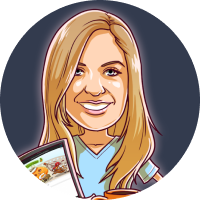
Summer break. Remember the good ole days of hanging out and doing nothing all summer like Huck Finn?
Once you decided to go to med school, those days are pretty much over. Although you do get a summer break between first and second year, most med students fill it with research or clinical experience – something to prep them for returning to school. Some do actually enjoy their last summer vacation.
However, even if you’ve spent your summer in a lab, job shadowing, or gaining patient care experience with a volunteer position, your brain might have taken a vacation from the habit of studying. Well, break’s nearly over!
With M2 looming, Picmonic is here for you and your back to school supply checklist. Read on to see what you need to prepare you for your second year of medical school.
Picmonic

Of course you need Picmonic for your second year of med school, especially if you didn’t have it the first year. This research-backed study tool helps you improve memory retention of information by 331% and score 50% higher on exams.
On top of that, it’s fun. That’s right…studying for medical school can be fun.
Just ask our 300,000+ users how much they’ve enjoyed studying Picmonic’s 1,300+ cards and 10,000+ facts.
A CV

If you haven’t already built your Curriculum Vitae (CV), or your medical resume, take these last few weeks of summer to at least outline it. Outlining what you’ve done (or haven’t done) allows you to build a plan moving forward for how much volunteering and experience you’ll need. Obviously, more competitive fields require extensive extracurricular experience.
Your first two years of medical school are when you have the most time for outside activities to build your CV for your residency application. Undergrad activities may contribute to your CV, but residency directors will be looking for a pattern of interest in your chosen field, community service and/or leadership.
Building your CV now will reveal what areas you need work in and where you are really shining.
An Understanding of AOA

Alpha Omega Alpha (AOA), a medical honor society, isn’t for everyone. But those seeking competitive residencies should learn about this society. Students are elected into this honor society in their third and fourth years of medical school based on academic standing, so what you do in this upcoming M2 year will partially determine your eligibility.
If you have your heart set on a certain residency program, do your research now to determine if AOA is a selection criteria.
Membership in a Club or Organization
Another thing that can make you an attractive residency candidate is participating in a club or organization. Possibly of equal importance, participation in a club can help you gain experience that increases your confidence as a healthcare provider.

If you already know what specialty you’re leaning toward, join an organization specific to that, like an dermatology or pediatric interest group. This will help you build relationships with faculty before you begin clinical rotations, and give you an opportunity to make sure that field is for you.
Join a club that will give you access to clinical experience. Especially if you are fresh out of undergrad, you will want to have patient exposure before your third year. This is a great way to work on your bedside manner, as well as get hands-on with the stuff you’ve been reading about.
Your Best Pep Talk
You survived M1. Well done. With that behind you, you may be more than a little scared about M2. Can you handle another year of intensive studying and rigorous course load?
Of course you can. We believe in you.
But more importantly, you must have confidence in yourself. This is where the pep talk comes in. Remind yourself why you’re doing this – why you want to become a doctor – and how hard you’ve worked to get here. Find motivational quotes that really get you going or speak with a mentor who will pump you up. Then continue pep talking yourself through M2 and passing the USMLE and so on.
Negative self-talk won’t help you. If you are beating yourself up, stop and think, “Would I say this to a friend of mine?” If you wouldn’t say it to a good friend, then don’t say it to yourself.
Feeling more prepared for your second year of medical school? Great!
Now go check out how Picmonic can help you succeed this year and prepare to take the USMLE!
Marlee Liberman, RN, Master Nursing Scholar
As a registered nurse, Marlee understands the struggles that nursing school throws at you – not to mention the overwhelming pressure preparing for the NCLEX®! Marlee brings a unique skill set and perspective to Picmonic with her previous degree in broadcast journalism, her creativity in video production, and her wandering nomad lifestyle. Her blend of talents provides her with the knack for simplifying complicated concepts and demystifying the world of nursing.














